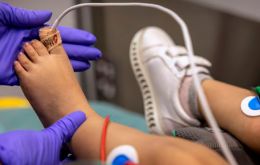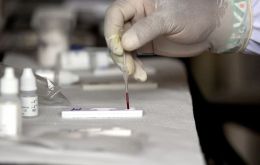MercoPress. South Atlantic News Agency
Tag: hepatitis
-
Monday, August 29th 2022 - 20:47 UTC
Uruguay chosen by WHO for hepatitis B and C program

Uruguayan authorities have announced that as of next month healthcare facilities will be surveyed to detect the presence of hepatitis B and C in order to provide input for the development and adjustment of policies regarding these maladies and meet World Health Organization (WHO) requirements to reduce the number of infected people by 2030.
-
Tuesday, May 17th 2022 - 09:30 UTC
Brazil opens situation room to monitor acute hepatitis

Brazilian health authorities have established during the weekend a monitoring room to oversee the development nationwide of the worrying acute hepatitis of unknown origin among children, of which the country has already reported 47 cases under study.
-
Friday, May 13th 2022 - 19:50 UTC
Paraguay braces for slight increase in coronavirus cases

Paraguayan Health authorities Friday announced they were expecting a slight rebound in the number of COVID-19 cases, based on local data and on that from neighboring countries.
-
Saturday, May 7th 2022 - 10:06 UTC
Eight cases of new hepatitis detected in Argentina, one in critical condition

Argentina's health authorities are investigating 8 cases of acute hepatitis which are suspected of belonging to the new variant of unknown origin, Health Minister Carla Vizzotti confirmed Friday.
-
Sunday, April 17th 2022 - 09:31 UTC
Disease outbreak in UK among children: acute hepatitis of unknown etiology

On 5 April 2022, the International Health Regulations (IHR) National Focal Point (NFP) for the United Kingdom notified WHO of 10 cases of severe acute hepatitis of unknown etiology in previously healthy young children (age range: 11 months to five-year-old) across central Scotland.
-
Wednesday, December 20th 2017 - 10:11 UTC
Acute intoxication with cyanobacteria and cyanotoxins in Montevideo beaches

An acute case of intoxication with cyanobacteria and cyanotoxins in recreational exposure during an algal bloom in Montevideo beaches, Malvin and Carrasco, was reported in the US National Library of Medicine, National Institutes of Health.
